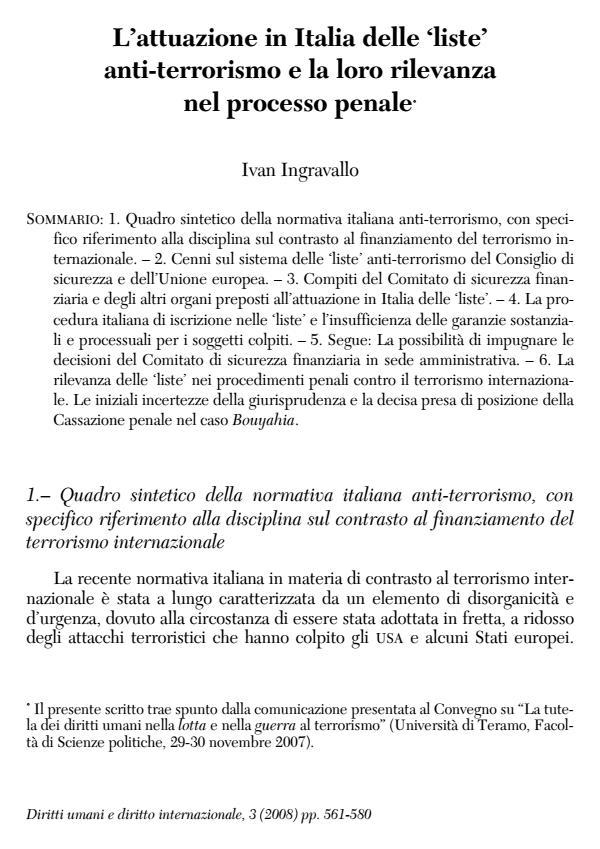L’attuazione in Italia delle ‘liste’ anti-terrorismo e la loro rilevanza nel processo penale*
Titolo Rivista DIRITTI UMANI E DIRITTO INTERNAZIONALE
Autori/Curatori Ivan Ingravallo
Anno di pubblicazione 2008 Fascicolo 2008/3 Lingua Italiano
Numero pagine 20 P. 561-580 Dimensione file 176 KB
DOI
Il DOI è il codice a barre della proprietà intellettuale: per saperne di più
clicca qui
Qui sotto puoi vedere in anteprima la prima pagina di questo articolo.
Se questo articolo ti interessa, lo puoi acquistare (e scaricare in formato pdf) seguendo le facili indicazioni per acquistare il download credit. Acquista Download Credits per scaricare questo Articolo in formato PDF

FrancoAngeli è membro della Publishers International Linking Association, Inc (PILA)associazione indipendente e non profit per facilitare (attraverso i servizi tecnologici implementati da CrossRef.org) l’accesso degli studiosi ai contenuti digitali nelle pubblicazioni professionali e scientifiche
The effects of the terrorism ‘blacklists’ on the Italian legal system and criminal proceedings - It is well known that at the UN the blacklisting mechanism is managed by an ad hoc Committee acting under the authority of the Security Council. In 2001 in Italy was created a new institution, the Financial Security Committee, playing a crucial role in the blacklisting mechanism. The Italian legislation on this topic, however, does not seem to offer an adequate protection of the human rights of the ‘suspected’ financial supporter for international terrorism, mainly for the potential role of the intelligence. In this context, it is important to evaluate the case-law of the Italian Supreme Court (Corte di Cassazione) on the role of the ‘blacklists’ in criminal proceedings. While some of the sentences decided in the aftermath of the emergency situation of the post 9/11 period show the unwillingness of the Court to criticize the use of the ‘blacklists’ in the criminal proceedings, at a later stage the Court expressed its opinion in the strongest way: the ‘blacklists’ derive from a political determination and cannot be considered as evidence; in the criminal proceeding they are only one among many elements that the prosecutors and the judges have to evaluate (Bouyahia case, decision no. 1072, October 11, 2006).;
Ivan Ingravallo, L’attuazione in Italia delle ‘liste’ anti-terrorismo e la loro rilevanza nel processo penale* in "DIRITTI UMANI E DIRITTO INTERNAZIONALE" 3/2008, pp 561-580, DOI: